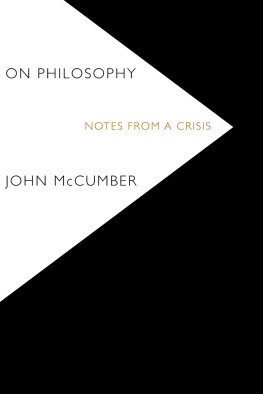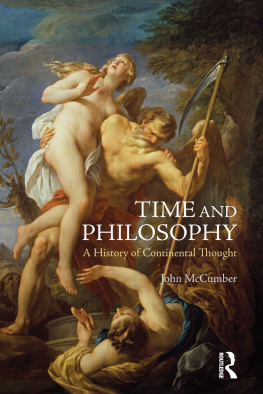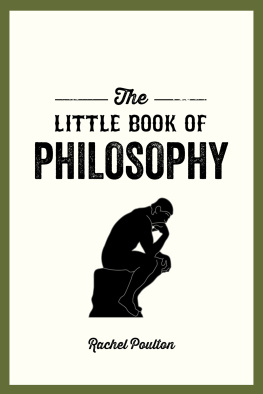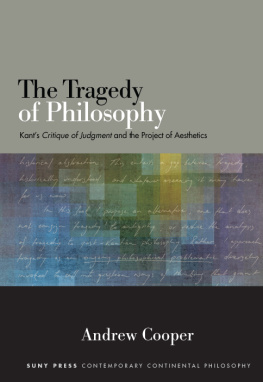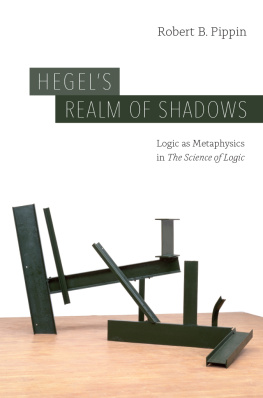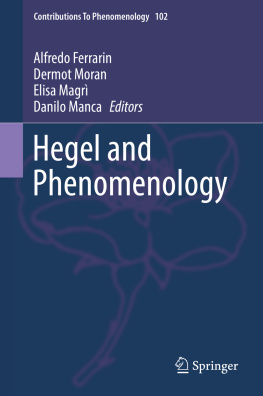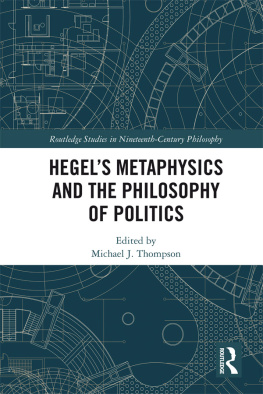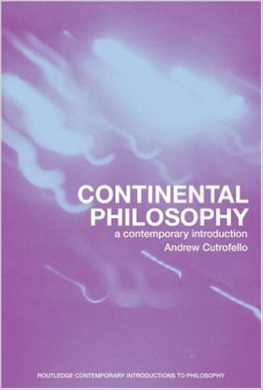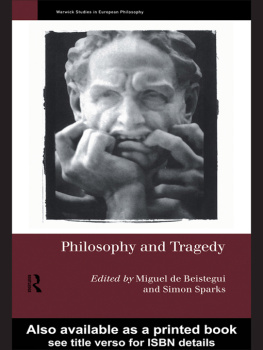ON PHILOSOPHY
NOTES FROM A CRISIS
JOHN McCUMBER
STANFORD UNIVERSITY PRESS
STANFORD, CALIFORNIA
Stanford University Press
Stanford, California
2013 by the Board of Trustees of the Leland Stanford Junior University. All rights reserved.
No part of this book may be reproduced or transmitted in any form or by any means, electronic or mechanical, including photocopying and recording, or in any information storage or retrieval system without the prior written permission of Stanford University Press.
Printed in the United States of America on acid-free, archival-quality paper
Library of Congress Cataloging-in-Publication Data
McCumber, John, author.
On philosophy : notes from a crisis / John McCumber.
pages cm
Includes bibliographical references and index.
ISBN 978-0-8047-8142-8 (cloth : alk. paper) ISBN 978-0-8047-8143-5 (pbk. : alk. paper) ISBN 978-0-8047-8349-1 (e-book)
1. Philosophy, ModernHistory. 2. Reason. 3. Metaphysics. I. Title.
B791.M44 2012
191dc23
2012014037
Typeset by Bruce Lundquist in 10/14 Minion Pro
In memory of David Laflin McCumber 19471994
CONTENTS
ACKNOWLEDGMENTS
I am indebted to Emily-Jane Cohen for her guidance at Stanford University Press, and to Amy Allen for feedback on the manuscript. An anonymous reader for the press was also very helpful. Conversations with Jonathan McCumber taught me much about David Foster Wallace.
Parts of this book descend from lectures given at the American Catholic Philosophical Association, Boston University, California State University at Los Angeles, DePaul University, Emory University, Haverford College, John Carroll University, Pomona College, the Radical Philosophy Association, SPEP, Suffolk University, Swarthmore College, Texas A&M University, and the University of North Texas. I am grateful for the generous hearing and critical feedback I received in each case.
ABBREVIATIONS
| APA | American Philosophical Association |
| AA | Immanuel Kant, Werke |
| BT | Martin Heidegger, Being and Time (marginal pagination) |
| CJ | Immanuel Kant, Critique of Judgment, cited after AA, vol. 5 |
| CPR | Immanuel Kant, Critique of Pure Reason, cited after AA |
| CPrR | Immanuel Kant, Critique of Practical Reason, cited after AA, vol. 5 |
| CW | John McCumber, The Company of Words: Hegel, Language, and Systematic Philosophy |
| DOe | Ren Descartes, Oeuvres |
| FFO | Iris Marion Young, Five Faces of Oppression |
| FR | Paul Rabinow, ed., The Foucault Reader |
| GM | Friedrich Nietzsche, On the Genealogy of Morality |
| GT | Judith Butler, Gender Trouble |
| HWe | G. W. F. Hegel, Werke |
| IJ | David Foster Wallace, Infinite Jest |
| IM | Robert Pippin, Idealism as Modernism |
| IP | Avner Cohen and Marcelo Dascal, eds., The Institution of Philosophy: A Discipline in Crisis? |
| MESM | Cynthia Willett, Maternal Ethics and Other Slave Moralities |
| MO | John McCumber, Metaphysics and Oppression |
| MR | Genevieve Lloyd, The Man of Reason |
| NFD | Frederick Douglass, Narrative of the Life of Frederick Douglass, an American Slave |
| NE | Aristotle, Nicomachean Ethics; cited after Bekker edition |
| OWA | Martin Heidegger, The Origin of the Work of Art |
| PF | John McCumber, Philosophy and Freedom |
| PhR | G. W. F. Hegel, Elements of the Philosophy of Right |
| PhS | G. W. F. Hegel, Phenomenology of Spirit |
| PI | John McCumber, Poetic Interaction |
| QT | Martin Heidegger, The Question Concerning Technology |
| R | Martin Heidegger, Die Selbstbehauptung der deutschen Universitt/Das Rektorat: 1933/34 |
| RC | Charles Mills, The Racial Contract |
| RR | John McCumber, Reshaping Reason |
| SC | Carole Pateman, The Sexual Contract |
| SG | Arthur Fine, The Shaky Game: Einstein, Realism, and the Quantum Theory |
| SL | G. W. F. Hegel, Science of Logic |
| SSI | Sandra Harding, Science and Social Inequality |
| TD | John McCumber, Time in the Ditch |
Further Notes on the Texts
Works of Aristotle will be cited after Aristotelis opera edidit Academia Regia Borussica, ed. Immanuel Bekker (Berlin, 18311870) [Bekker edition].
Works of Descartes will be cited after Oeuvres de Descartes, ed. Charles Adam and Paul Tannery, 12 vols. (Paris: Cerf, 18971910).
Works of Kant will be cited by volume and page number of the Berlin Academy edition, Werke, 28 vols. (Berlin, 1902) [hereinafter AA, except for the Critique of Pure Reason (CPR), which will be cited by page numbers to the A and B editions in the Academy edition. The Critique of Judgment (CJ) and the Critique of Practical Reason (CPrR) are in volume 5 of the Academy edition.
Works of Plato will be cited after Platonis opera quae extante omnia, ed. Henri Estienne (Paris, 1578) [Stephanus edition].
All translations unless otherwise noted are my own.
INTRODUCTION
A little over twenty years ago, according to a 1989 anthology edited by Avner Cohen and Marcelo Dascal, there may have been a crisis in philosophy. Such, they suggest, occurs when dissidents question the accepted standards on all fronts (IP, xiii), and at that time two main challenges appeared to be underway. Globally, the rise of postmodernism was throwing into doubt both the meaning and the usefulness of such accepted normative terms as truth, reason, freedom, and progress. Within philosophy itself, at least within American philosophy, the pluralist revolt at the American Philosophical Association (APA) was challenging the clubby practices by which leadership roles were distributed among professors in leading departments of philosophy.
I will say more about postmodernism in the course of this book. As to the pluralists, I will simply note that their revolt was consciously modeled on the larger revolt of people of color, nonheterosexuals, and women which, by that time, had already been underway for about twenty-five years. The pluralists claimed, as A. J. Mandt shows in his essay in the anthology (Mandt 1989), that they were being adversely judged not on the basis of their philosophical merits as individuals but on the basis of philosophical groupings to which they belonged (e.g., phenomenologists, pragmatists, Catholics). The response of the philosophical establishment to the pluralists, as Mandt conveys it, was very like establishment responses to those earlier demands: a denial that anyone in a position of power was personally prejudiced against such groups, coupled with a self-reassuring insistence that philosophical rewards were in fact distributed solely in terms of philosophical merit. A paraphrase of Saul Bellows famous remark on African writers captures the spirit: When they produce [Quines and Davidsons], we will read them.
Next page
